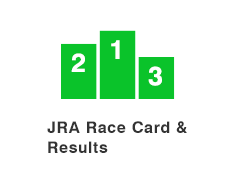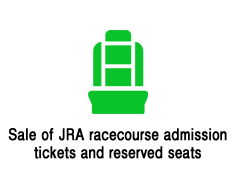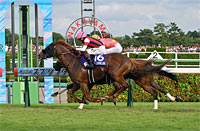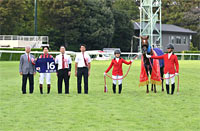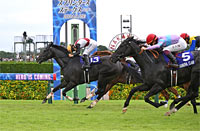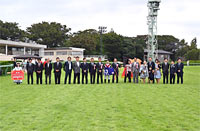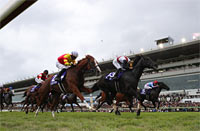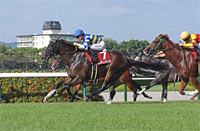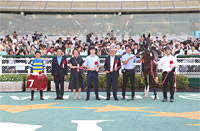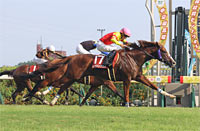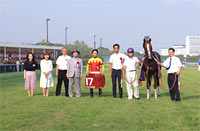2015 News
Data Analysis for the “2015 Sprinters Stakes (G1)”Autumn G1 series kicks off with a clash of top sprinters Last year’s Sprinters Stakes (held at Niigata Racecourse) was won by 13th favorite Snow Dragon with win odds of 46.5, producing a huge Trifecta payout of 190,930 yen. However, Snow Dragon had already finished runner-up in that year’s Takamatsunomiya Kinen. In fact, of the last 10 winners of this race, all except Sleepless Night in 2008 and Curren Chan in 2011 had experienced a top 3 finish in a domestic or overseas G1 race within the previous 12 months. So which horse will win this clash of top sprinters, scene of many a famous tussle in the past, to reach the pinnacle of turf sprint racing? This time, let’s analyze some key points shared by good performers in this race from results over the last 10 years (including 2014, when it was held at Niigata). Check this year's performance Of a total of 20 top 2 finishers over the last 10 years, 12 had already experienced a top 2 finish in a JRA G1 or G2 race that year. These horses have notched a top 2 ratio of 30.0% and a top 3 ratio of 35.0%, easily outperforming runners without such experience. A degree of reliance may be placed in horses that come with a track record of top 2 finishes in JRA G1 or G2 since the start of the year. [Table 1] [Table 1] Horses with top 2 finish in JRA G1 or G2 races that year (last 10 years)
Front-runners in the previous race are solid performers Let’s now compare the performance of horses most recently appearing in JRA races by their position at the 4th corner in that race. Runners passing the 4th corner in the “First 3” positions last time out have achieved a top 3 ratio of 40.5% in this race, while those passing it in “4th or lower” position have struggled somewhat, with a top 3 ratio of only 10.5%. We should focus more on horses with strong front-running ability, rather than those that prefer the middle or rear of the pack. [Table 2] [Table 2] Performance by position at 4th corner in previous JRA race outing (last 10 years)
Discount ages 6-and-up Of a total of 30 top 3 finishers over the last 10 years, 22 were aged “5 or less.” Conversely, those aged “6 and up” have struggled, with a top 3 ratio of only 9.9%. It seems we should not have rely too heavily on horses aged “6 and up”. [Table 3] [Table 3] Performance by age (last 10 years)
The picture is even clearer when comparing performances of only the Japanese runners by age; those aged “6 and up” have an even poorer top 3 ratio of 7.1%. We should have particularly low expectations of Japanese horses aged “6 and up”. [Table 4] [Table 4] Performance of Japanese horses by age (last 10 years)
Poor showing when previous race was anything but turf 1,200m Of a total of 27 top 3 finishers over the last 9 years, all except San Carlo (3rd in 2010) had most recently appeared in a “Turf 1,200m” race. Actually, all of the top 3 finishers 10 years ago in 2005 had a run in a prep race over 1,600m on turf, but horses coming straight from a turf 1,200m race have been overwhelmingly dominant since then. [Table 5] [Table 5] Performance by course of previous race (last 9 years)
Focus on horses taking part in principal prep races Of a total of 12 top 3 finishers over the last 4 years, all except 2014 runner-up Straight Girl (previous race: Hakodate Sprint Stakes) had come straight from contesting in the “Centaur Stakes” or the “Keeneland Cup.” This year too, our attention should first be on runners coming from these two races. [Table 6] [Table 6] Performance by previous race (last 4 years)
More specifically, of horses most recently contesting in the “Centaur Stakes” or the “Keeneland Cup,” those finishing “In the top 4” in those races have achieved relatively high success ratios, with a top 2 ratio of 27.3% and a top 3 ratio of 36.4%. [Table 7] [Table 7] Performance by finish in previous race when it was the "Centaur Stakes" or "Keeneland Cup" (last 4 years)
Again, of horses most recently seen in the “Centaur Stakes” or the “Keeneland Cup,” those backed “In the top 4 favorites” to win that race have also marked relatively high success ratios here, with a top 2 ratio of 29.2% and a top 3 ratio of 41.7%. If trends in recent years are anything to go by, our eye should be on runners supported by strong favoritism in the “Centaur Stakes” or the “Keeneland Cup,” with a final placing to justify that backing. [Table 8] [Table 8] Performance by favoritism to win previous race when it was the"Centaur Stakes"or the"Keeneland Cup"(last 4 years)
Seek out the winner! All of the last 4 winners had finished in the top 2 in a JRA G1 or G2 race since the turn of that year. They had also appeared most recently in the “Centaur Stakes” or the “Keeneland Cup,” and had been backed among the top 4th favorites to win that race. Horses that can clear the conditions set in Table 1 and Tables 6 to 8 could be seen as leading candidates to win this race. [Table 9] [Table 9] Winners' highest finish in a JRA G1 or G2 race that year, previous race, and favoritism to win previous race (last 4 years)
(Data analysis by Masaya Ibuki) |
|






